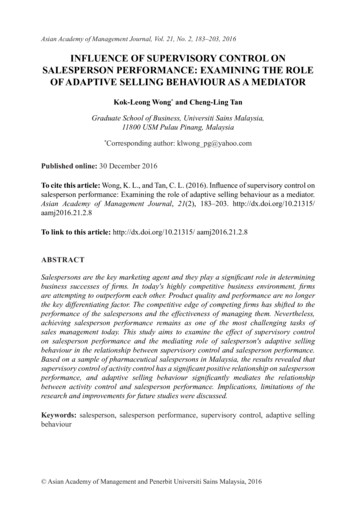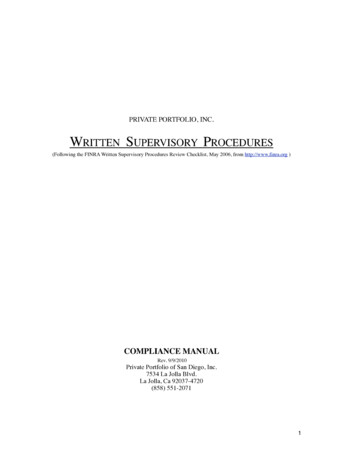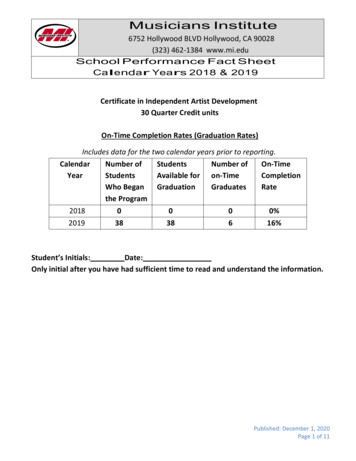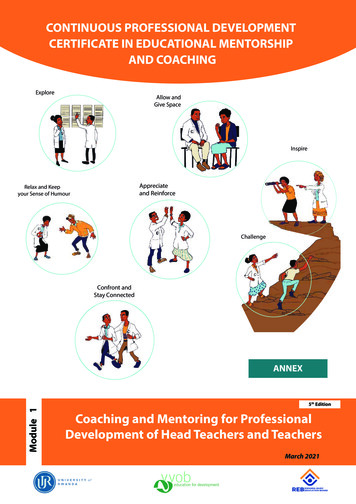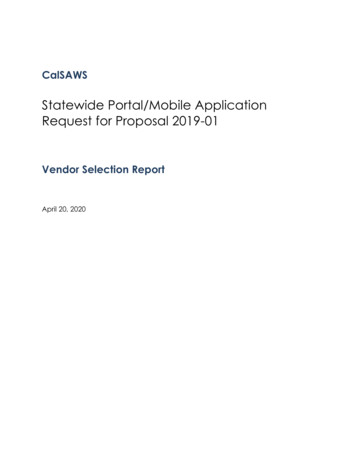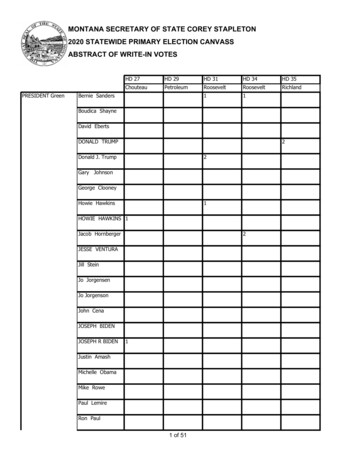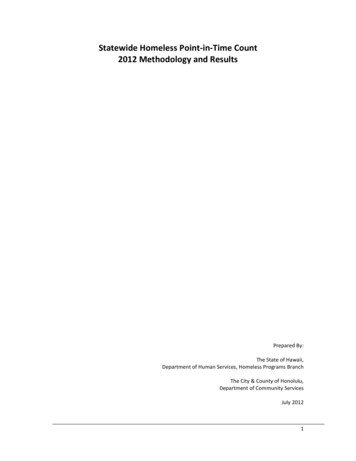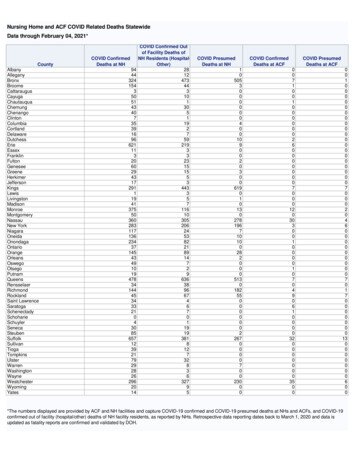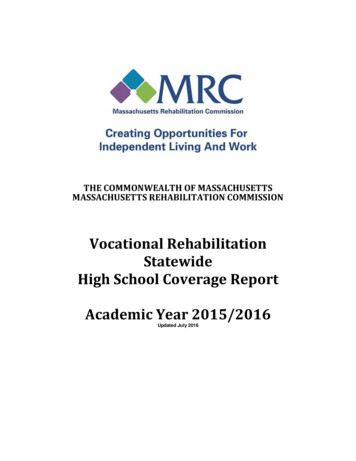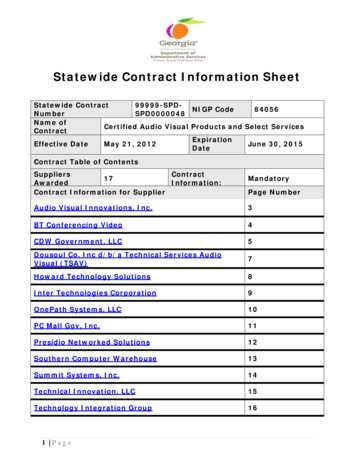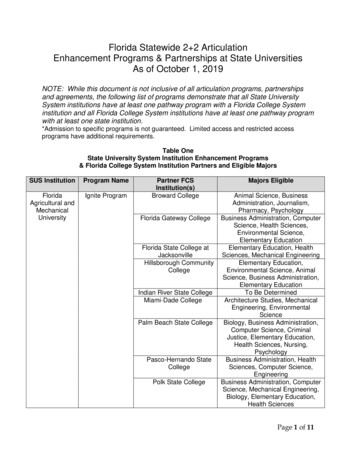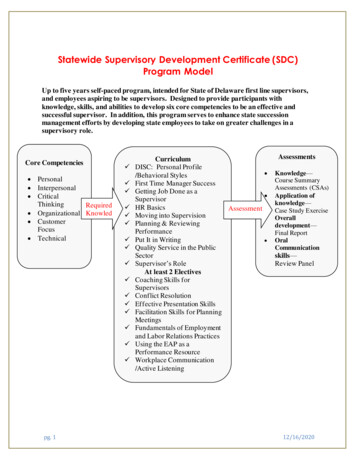
Transcription
Statewide Supervisory Development Certificate (SDC)Program ModelUp to five years self-paced program, intended for State of Delaware first line supervisors,and employees aspiring to be supervisors. Designed to provide participants withknowledge, skills, and abilities to develop six core competencies to be an effective andsuccessful supervisor. In addition, this program serves to enhance state successionmanagement efforts by developing state employees to take on greater challenges in asupervisory role.Core Competencies izational KnowledgeCustomerFocusTechnical pg. 1CurriculumDISC: Personal Profile /Behavioral StylesFirst Time Manager SuccessGetting Job Done as a SupervisorHR BasicsAssessmentMoving into Supervision Planning & ReviewingPerformancePut It in Writing Quality Service in the PublicSectorSupervisor’s RoleAt least 2 ElectivesCoaching Skills forSupervisorsConflict ResolutionEffective Presentation SkillsFacilitation Skills for PlanningMeetingsFundamentals of Employmentand Labor Relations PracticesUsing the EAP as aPerformance ResourceWorkplace Communication/Active ListeningAssessmentsKnowledge—Course SummaryAssessments (CSAs)Application ofknowledge—Case Study ExerciseOveralldevelopment—Final ReportOralCommunicationskills—Review Panel12/16/2020
Detailed SDC Program Core Competencies:Personal Competencies Self-awareness—Recognizes own strengths and weakness. Seeks opportunities forpersonal learning and development. Ethics and Values—Follows laws, regulations, policies, etc. related to job. Modelshigh standards of honesty, integrity, trust, creditability, openness and respect.Interpersonal Competencies Interpersonal Communication—Uses active listening techniques such asparaphrasing, open and probing questions to understand ideas, concepts, and feelingsof another. Uses a variety of communication tools to ensure understanding. Interpersonal Responsiveness—Adapts approaches to suit different people andsituations. Shows sensitivity of culture, race, gender, and other individual differences. Group/Team Dynamics—Encourages and facilitates cooperation.Critical Thinking Data Gathering—Gathers information from a variety of sources for decision making.Involves others in problem solving. Analysis—Uses appropriate analytical tools to understand data. Monitorsenvironment, goals, and outcomes for problems and opportunities for improvement.Uses systematic approach to solving problems. Involves others in problem solving. Problem Solving—Monitors environment, goals, outcomes, etc. for problems andopportunities for improvement. Uses appropriate data gathering, analysis, andsynthesis tools. Uses systematic approach to solving problems. Involves others inproblem solving.Organizational Competencies Planning—Uses larger organizational plan as basis for local planning; coordinateswith other parts of the organization to accomplish goals. Goal Setting & Implementation—Understands and communicates goals, outcomes,standards, and performance measurement criteria. Policy/Procedure Implementation—Understands basic policies and procedures in statesystem ie. Merit Rules, Sexual Harassment Prevention. Consults with others to ensureappropriate implementation of policies. Innovation—Seeks to improve effectiveness of internal processes and of servicedelivery to clients. Applies creative solutions in dealing with problems andorganizational issues. Government Infrastructure—Understands the roles, dynamics, and division of powerbetween the executive, legislative, elected officials, and judicial branches.Understands where they and their organization fit into the organizational structure ofstate government.pg. 212/16/2020
Detailed SDC Program Core Competencies(Continued):Customer FocusMonitors customer needs and seeks to improve effectiveness and quality of internal processesand of service delivery to clients.Technical Competencies Program Knowledge—Demonstrates understanding of the requirements, knowledge,competencies of the various jobs supervised. Keeps up-to-date in technical andprogram skills. Technology Management—Integrates technology into the workplace.pg. 312/16/2020
SDC Program Required Courses, Competencies and ObjectivesCourse Title &Competencies DevelopedDISC Personal Profile/BehavioralStyleso Critical Thinkingo Personal Competencieso Interpersonal CompetenciesGetting the Job Done as a Supervisoro Interpersonal Competencieso Critical Thinking Competencieso Organizational Competencieso Customer Focus Competencieso Technical Competenciespg. 4Course Objectives1. Describe the four different behavioral styles.2. Identify your preferred behavioral style.3. Explain the strengths and limitations of eachof the four behavioral styles.4. Develop strategies for working with peoplewith different behavior tendencies to buildeffective relationships and increaseproductivity.1. Use effective organization and timemanagement practices.2. Set SMART goals.3. Establish work priorities effectively4. Apply Situational Leadership effectively toincrease work productivity.5. Delegate work effectively.6. Use common sense approaches to increasework productivity.12/16/2020
SDC Program Required Courses, Competencies and Objectives(Continued):Course Title &Competencies DevelopedHR Basics (online)o Personal Competencieso Organizational Competencieso Customer Focus Competencieso Interpersonal CompetencyFirst Time Management Success(Online, replacing Human Side ofManagement)o Personal Competencieso Interpersonal Competencieso Critical Thinking CompetenciesCourse Objectives1. Identify all available resources used to applyState merit system HR policies and proceduresconsistently.2. Restate basic information about at least threeState merit employee benefit programs.3. Discuss the six various HR services provided.4. Describe State merit system workplaceexpectations related to ethics, safety andsecurity.5. Explain State merit system (1) probationaryperiods, (2) performance plans, and (3)performance reviews.1. Describe the four management styles ofeffective leaders to include Autocratic,Democratic, Consultative, Laissez Faire2. Identify methods to effectively deal withunderperformance.3. Explain the importance of delegation and howthe Skill/Will Matrix can be used to delegatetasks.4. Discuss approaches to motivate and coachothers as a supervisor.5. Identify effective management skills.6. Describe Kotter’s Change Method and how itis used to introduce changeMoving into Supervisiono Interpersonal Competencieso Personal Competencieso Critical Thinking Competencieso Technical Competenciespg. 51. Explain the roles and responsibilities of asupervisor within an organization.2. Identify characteristics of effective andineffective supervisors.3. Ease the transition from employee tosupervisor.4. Discuss five principles of becoming aneffective supervisor.12/16/2020
SDC Program Required Courses, Competencies and Objectives(Continued):Course Title &Competencies DevelopedPlanning and ReviewingPerformanceo Interpersonal Competencieso Critical Thinking Competencieso Organizational Competencieso Technical CompetenciesCourse Objectives1. Explain how Performance Plan and Review can beused to increase employee productivity, motivation,and learning2. Describe how to prepare both supervisors andemployees for collaborative Performance Reviews3. Prepare specific and objective documentation thatdemonstrates employee performance and clarifiesprogress toward identified goals4. Conduct a collaborative plan and review5. Use the State’s Performance Planning and ReviewprocessPut it in Writingo Interpersonal Competencyo Critical Thinking1. Write with clarity so the reader cannot possiblymisunderstand.2. Write and organize your thoughts faster withoutfalse starts and rewrites.3. Write with an image that pleases the reader anddignifies you and your organization.Quality Service in the PublicSectoro Interpersonal Competencieso Customer Focus Competencies1. Describe Quality Customer Service2. Describe how Customer Service differs in thePublic Sector vs. the Private Sector.3. Explain the Types of Listening Skills and When toUse Them.4. Discuss techniques and skills for working withdifficult customers.Supervisor’s Role (Online)o Interpersonal Competencieso Personal Competencieso Critical ThinkingCompetencieso Technical Competencies1. Explain the evolution of Supervision.2. Describe at least six qualities of a good supervisor.3. Describe the skills needed to be an effectivesupervisor.4. Explain at least four functions of a supervisor.5. Identify at least three factors to consider in learningto become an effective supervisor.pg. 612/16/2020
SDC Program Elective Courses, Competencies and ObjectivesCourse Title &Competencies DevelopedCoaching Skills for Supervisorso Personal Competencieso Interpersonal CompetenciesCourse Objectives1. Identify the Personal and Organizational Benefits ofeffective Coaching Skills.2. Explain Characteristics that contribute to being anEffective Coach.3. Identify Key Coaching Opportunities in theWorkplace.4. Apply the Four-Step Courage to Coach Model toCoach for Improved Performance.Conflict Resolutiono Personal Competencieso Interpersonal Competencieso Customer Focus Competencies1. Define conflict and conflict resolution2. Identify your preferred style for handling conflict.3. Use effective communication skills to help resolveconflict.4. Use the CALM Model to resolve conflicts.Effective Presentation Skills.o Interpersonal Competencies1. Identify strategies for dealing with the anxietyassociated with giving presentations2. Describe the steps involved in giving a winningpresentation3. Present on a topic for 3 – 5 minutes4. Discuss other tips for making your presentationsuccessfulFacilitation Skills for PlanningMeetingso Interpersonal Competencieso Technical Competencies1. Explain the roles and responsibilities of a facilitator.2. Identify the key skills needed to facilitate meetingseffectively3. Design a plan for a meeting that meets your group’sneeds4. Use tools and techniques that will engageparticipants and increase their participation5. Develop strategies to hand challenging meetingsituationspg. 712/16/2020
SDC Program Elective Courses, Competencies and Objectives(Continued)Course Title &Course ObjectivesCompetencies DevelopedFundamentals of Employment1. Describe steps used to conduct an effectiveand Labor Relations Practicesinvestigation.o Interpersonal Competencies2. Prepare an initial investigation Plan.o Critical Thinking Competencies 3. Use the Just Cause standards to prepare defensibleo Organizational CompetenciesDiscipline documentation.4. Distinguish the difference between a MeritGrievance, Collective Bargaining Agreement(CBA) Grievance, and a complaint.5. Discuss Merit and CBA Grievance procedures.6. Use the Interactive Process to respond to triggerssignaling the need for an ADA response.7. Identify examples of reasonable Accommodationsin the workplace.Using the EAP as a PerformanceImprovement Resourceo Interpersonal Competencieso Technical Competencies1. Describe the Supervisor’s role in the referralprocess to HMS/EAP.2. Explain the 5-step referral process to referemployees to HMS/EAP.3. Identify at least 5 tips for coping with employeereactions during your interview with an employee.Workplace Communication andActive Listeningo Personal Competencieso Interpersonal Competencieso Critical Thinking Competencypg. 81. Use the Five Critical Elements of CommunicationModel to make you a more responsible speaker2. Identify your preferred communication style andadapt the way you communicate to meet the needsof your audience3. Recognize the importance of non-verbal cues anduse them to increase the effectiveness of yourcommunication4. Create and maintain healthy communicationboundaries that foster an environment of opencommunication5. Use active listening skills to increase your ability asan effective and responsive listener6. Develop strategies to overcome common barriers toeffective listening12/16/2020
productivity. Getting the Job Done as a Supervisor o Interpersonal Competencies o Critical Thinking Competencies . Effective Coach. 3. Identify Key Coaching Opportunities in the Workplace. 4. Apply the Four-Step Courage to Coach

